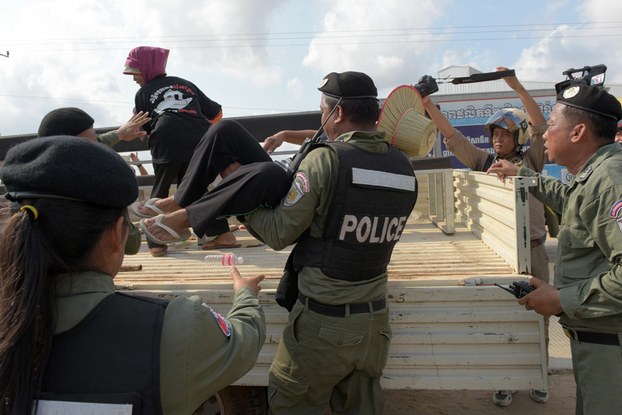Cambodia must stop attacking civil society and rights activists: U.N. rights experts
| Publisher | Radio Free Asia |
| Publication Date | 13 May 2016 |
| Cite as | Radio Free Asia, Cambodia must stop attacking civil society and rights activists: U.N. rights experts, 13 May 2016, available at: https://www.refworld.org/docid/5760fbe3c.html [accessed 30 May 2023] |
| Disclaimer | This is not a UNHCR publication. UNHCR is not responsible for, nor does it necessarily endorse, its content. Any views expressed are solely those of the author or publisher and do not necessarily reflect those of UNHCR, the United Nations or its Member States. |
2016-05-13
 A Cambodian policeman loads a protester into the back of a police truck during a demonstration in Phnom Penh demanding the release of detained rights defenders, May 9, 2016. AFP
A Cambodian policeman loads a protester into the back of a police truck during a demonstration in Phnom Penh demanding the release of detained rights defenders, May 9, 2016. AFP
The Cambodian government must immediately end its attacks on civil society members, rights activists, and political opposition figures and take effective steps to preserve political freedoms in the Southeast Asian country, a group of United Nations experts on human rights said on Thursday.
The U.N. appeal follows the jailing last week of five officers of the Cambodian rights group ADHOC on charges they had conspired to bribe a woman to deny she was a mistress of deputy leader Kem Sokha of the opposition Cambodia National Rescue Party (CNRP).
Government handling of the case and prejudicial public statements by senior officials of the ruling Cambodian People's Party (CPP) suggest "that this entire episode is nothing more than a politically-motivated persecution of civil society," the May 13 U.N. statement said.
"We urge the Cambodian authorities to ensure a safe and enabling environment for human rights defenders and civil society, which play a critical role in holding the Government to account and bringing benefits of human rights to the whole of Cambodian society," the statement said.
Government responds
Speaking in an interview with RFA's Khmer Service on Friday, a government spokesman slammed the U.N. experts' remarks as interference in the country's affairs, saying that the U.N. itself should "learn" from Cambodia's experience.
"I don't think that U.N. officials are capable of managing a country," Council of Ministers spokesman Phay Siphan said.
"Look at the Middle East. There, the U.N. can only do things to try to ease tensions, but they have no experience in keeping the peace."
The five ADHOC members were arrested only because they had broken the law, Phay Siphan said, adding, "Cambodia welcomes the contributions of NGOs in helping to develop the country."
'Tipping point'
Political tensions between the ruling CPP and the CNRP have grown worse in recent months, with the government arresting more than a dozen opposition lawmakers including Senator Hong Sok Hour, CNRP media director Meach Sovannara, and Um Sam An, an opposition member of parliament.
Cambodia's contentious and at times violent political situation has pushed it "close to a dangerous tipping point," the United Nations' special human rights envoy to Cambodia said in March.
Rhona Smith, the U.N. special rapporteur to Cambodia on human rights, said that tensions driven by the rivalry between the two parties had grown worse since her last visit in September 2015.
"The political situation, which includes renewed threats, judicial proceedings, and even physical beatings of members of the opposition is worrying," she said in a reference to the CPP's crackdown on CNRP politicians and activists.
Reported by Sothearin Yeang for RFA's Khmer Service. Translated by Samean Yun. Written in English by Richard Finney.
Link to original story on RFA website
